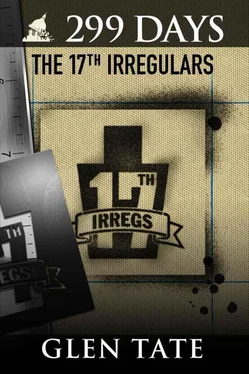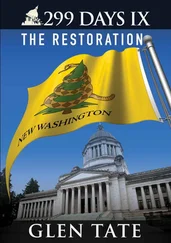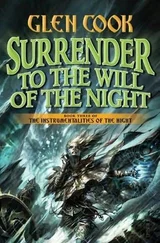Andrew’s background was thoroughly checked out. They determined that he was safe. He had no outside interests; all he did was work, so he wasn’t political. He didn’t drink, do drugs, or chase women (or men), so he wouldn’t be compromised that way. He was Jewish so the assumption was made that he wouldn’t be one of the Bible-thumping right-wing Patriots. He would probably be afraid of what the redneck Patriots would do if they got power: set up an evangelical Christian theocracy. That’s what the Loyalists kept telling themselves. By breaking the Patriots in Operation Cracker Corral, the Loyalists thought they were preventing a bigoted Christian theocracy. Surely, a Jew would want to help with that effort. Therefore, Andrew could be trusted with some of the most sensitive secrets the FUSA had.
At first, Andrew was just doing his job. With all the other government workers out of a job, he was glad to have the work. He really didn’t care what he was working on; he was working. He began his work by reading the top secret project overview memorandum for something called Operation Cracker Corral.
The moment Andrew saw the project overview he knew exactly what it was: genocide. His grandfather had lived through one of those and it wouldn’t happen again, no matter what religion the victims were. Not if Andrew could do anything about it.
And he could. Rod Evans, a neighbor in his DC suburb, seemed like one of those Patriot people. Before the Collapse, Andrew noticed that Rod occasionally wore one of those “Don’t Tread on Me” t-shirts. Rod had a younger brother who was a math geek, so he felt for Andrew and knew how hard it to be social when you’re so brilliant in one concentrated part of your brain. He went out of his way to be friendly to him.
Andrew didn’t know why, but he was definitely drawn to Rod. After a long sleepless night of worrying about Cracker Corral and wondering if he could trust Rod, Andrew went over to Rod’s house the next morning.
“Um, Rod,” Andrew whispered while looking down at the ground, “can you get a hold of the Patriots?”
“No,” Rod said, “Of course not. I don’t know any of those people.” This wasn’t true, but Rod was going to play it safe since he had no idea if Andrew was working for the Freedom Corps.
Then Rod thought about it. He knew that mathematicians’ brains, like Andrew’s and Rod’s brother’s, were almost always stuck in logical, concrete thought, and were nearly incapable of making things up. This generally made them terrible liars. Ron’s gut just told him Andrew was trustworthy.
“Well,” Rod said, “maybe.”
Andrew felt a surge of confidence. He couldn’t explain it, but he knew with absolute certainty that he was doing the right thing. He kept thinking of those pictures of his grandfather as a little boy in a concentration camp.
Andrew whispered, “I have an important document—a very, very important document—that I need you to get to them.”
Rod nodded. He could sense that Andrew was not exaggerating and that this was extremely important.
“I’ll have it in a few days,” Andrew said and then abruptly walked out of Rod’s house. Andrew wasn’t rude; he was just socially awkward.
Andrew had to go through a lot to print out the memo and smuggle it out of his office. It was easier to get through the security system by printing it out rather than making an electronic copy. Besides, Andrew wanted to print it on official Homeland Security letterhead because he knew the Patriots analyzing it would be able to tell it was real DHS paper. Andrew needed the Patriots to understand that this memo was real, not some sick joke.
Two days later, after the daunting feat of stealing the memo, Andrew put it in an envelope and gave it to Rod.
“This is sealed,” Andrew said to Rod. “Don’t open it. They need to know it’s authentic.” Andrew included in the envelope his official Homeland Security ID badge, an item that would let the Patriots know he was legitimate.
Rod nodded and took it the Patriots that he knew, who were some low-level guys. He hoped it got to the right people.
It sure did. Within a few days, the memo was in the hands of the top Patriot intelligence people. They verified the contents of the memo with their moles in the FUSA intelligence community.
The Patriots quickly came up with a plan and contacted the top Oath Keeper generals in the FUSA military.
There weren’t as many Oath Keeper generals as there were lower level officers and enlistees because only politically loyal people were promoted to general and admiral. However, there were still a few officers who were so good at their jobs that they had to be promoted, even if they were not “political.” Most of them didn’t care about politics at all, but they saw what was going on and could not be a part of it. They were Oath Keepers because of the gravity of the situation, not because they wanted to be.
A handful of Oath Keeper generals were not doing this out of a sense of necessity. They were actively trying to infiltrate the military to have the maximum impact they could, in order to save the country. They stayed in the military because they knew they could do more for the Patriots where they were: on the inside, and at the top. Andrew’s memo was the perfect example of why they needed to be where they were. Their plan capitalized on the fact they were generals in charge of powerful military assets.
The generals came up with what became known as the “Utility Treaty,” and then they met with the FUSA Loyalist leadership and offered them a deal. If the Loyalists did not go through with Cracker Corral, then the generals would not defect to the Patriots. If the Loyalists took the deal, the huge military assets the Patriot generals and admirals commanded—divisions, air wings, and aircraft carrier battle groups—would “sit out” during the Collapse. They would not join the Patriots, but they would not join the Loyalists, either. They would just sit it out, which was very popular with the generals’ troops.
Besides humanitarian motives, the generals also knew that cutting off utilities to rural areas and the Southern states would mean massive civil unrest; even more than there already was. They knew that they, and their troops, would be called on to go put down the revolts and be drawn into an unwinnable insurgency in the American heartland. They didn’t want to kill thousands of Americans, or be killed themselves. Sitting it out seemed like a much better option for everyone involved, except the douche bag Loyalist politicians, but who cared.
The Loyalists’ first reaction was to call for the court martial of the generals and admirals. They even briefly detained them until they realized that they could avert a full-scale civil war simply by not going through with Cracker Corral. At this point, the regular military, or what was left of it, was largely leaning toward the Patriot side, and the Loyalists were terrified of even more regular units going over to the Patriots. Besides, many Loyalists were opposed to Cracker Corral, themselves. It went too far. It would kill too many Americans.
The Loyalist leadership agreed to cancel Cracker Corral. That whole process—from Andrew Berkowitz discovering the plan, getting the memo to the Patriots, the generals’ meeting with the Loyalist leadership, and the Loyalists’ decision to cancel the operation—lasted eight days. Those were the eight days that Forks, and about a hundred other towns, were without electricity.
Chapter 172
Born in This World as It All Falls Apart
(July 6)
Manda Matson got up a little early. It was 6:00 a.m. and the sun was up. It was yet another beautiful sunny summer day.
Manda was very careful not to wake her brother. They slept in the same bed in the upstairs loft of her family’s cabin at Pierce Point. In the next bed over, were her grandma and grandpa. Grandpa snored, but Manda was getting used to it.
Читать дальше











